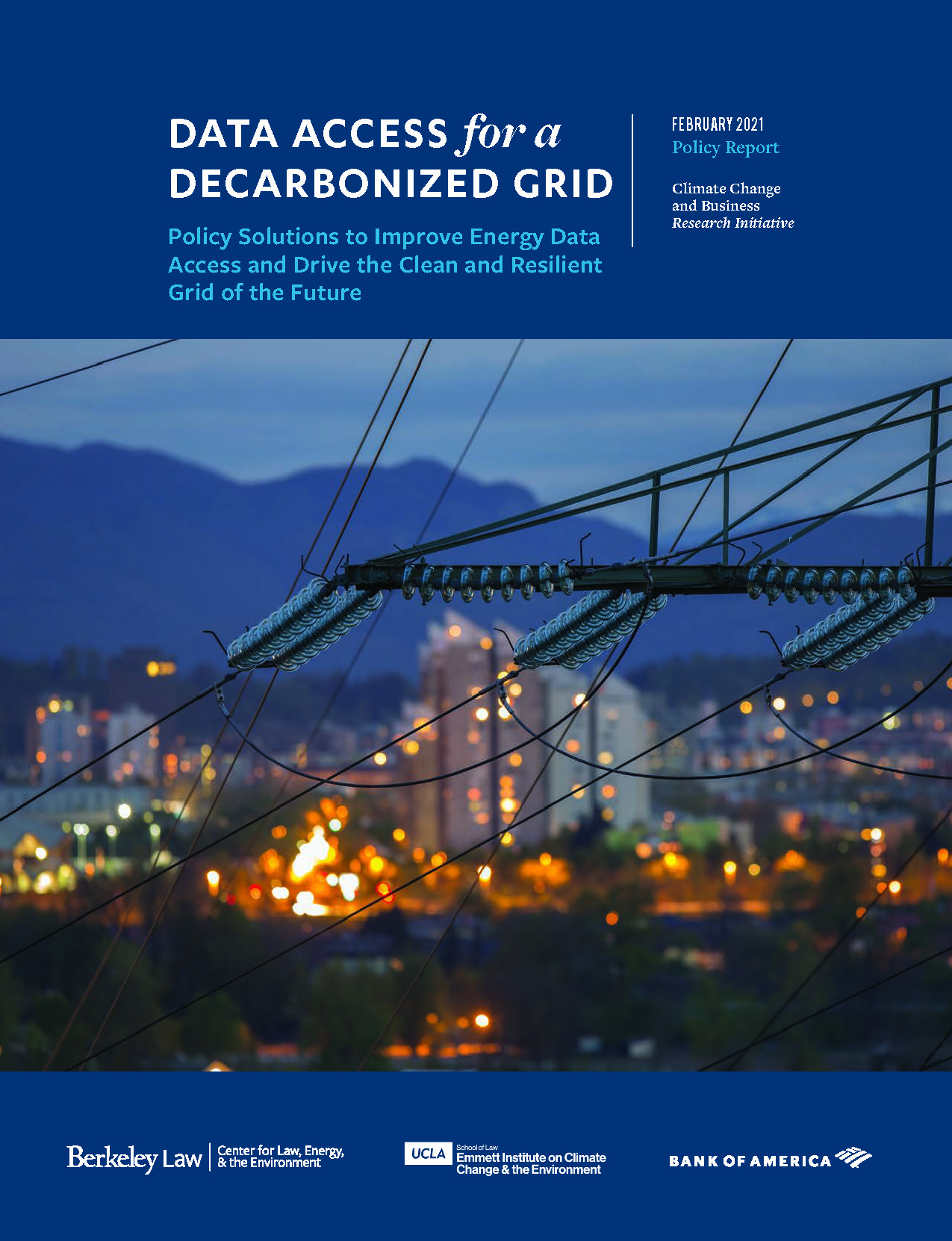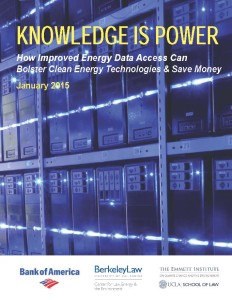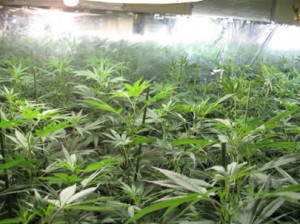Today, the Center for Law, Energy and the Environment (CLEE) at Berkeley Law and the Emmett Institute on Climate Change and the Environment at UCLA Law are releasing a new report, Data Access for a Decarbonized Grid, which highlights key policy solutions to expand access to the energy data needed to operate a fully decarbonized grid.
Join our webinar on Wednesday, April 7 at 10am PT to learn more.

As California approaches the state target of delivering 100 percent zero-carbon power by 2045, state leaders face the challenge of decarbonizing electricity by rapidly expanding the use of renewable energy sources. At the same time, they face increasingly severe heat waves and wildfires that threaten the reliability and resilience of the grid.
Individuals, businesses, and utilities are turning to a growing group of flexible grid technologies to meet this challenge—such as distributed renewables, small-scale battery storage, and smart appliances and building energy management. They are becoming increasingly mainstream and affordable. But these technologies, which facilitate the flexibility needed to deliver reliable power on a fully renewable grid, also rely on constant flows of energy data in order to operate effectively and efficiently.
The data include grid structure and operations data that depict system assets and capacity; customer-level data on consumption and rates; and real-time performance data for distributed generation and storage assets. Utilities, technology providers, and residents already exchange these data in abundant quantities. However, a set of regulatory, privacy, and incentive-based challenges limit the ability of regulators, utilities, and developers to generate and manage the data optimally.
These barriers include utility business and regulatory incentives that reward major physical capital investments over data management initiatives; potentially outdated rules restricting customer data-sharing; and concerns around cybersecurity and physical grid asset security.
To identify solutions to these challenges, CLEE and UCLA Law’s Emmett Institute convened a group of energy data experts in August 2020, and our new report details the solutions including:
- Adopting performance-based regulation of electric utilities to provide financial incentives for high-quality, efficient data generation and management.
- Re-examining the California Public Utilities Commission’s 15/15 rule for customer data aggregation (which sets numerical limits on customer cohorts) and considering use of differential privacy methods instead.
- Modernizing utility IT systems to adapt to rapidly evolving technological and customer needs.
Ultimately, a fully decarbonized electrical supply will require a large-scale restructuring of the grid across generation, distribution, and consumption activities. In the face of growing threats to grid resilience and reliability, California energy leaders will have to help energy producers and consumers throughout the state gain access to the flexible grid technologies needed to maximize efficiency and minimize service disruption. Ensuring the optimal flow of energy data is vital to that effort.
You can access the report and its full set of recommendations here.
You can also learn more about state priorities for increasing access to energy data by joining CLEE and the Emmett Institute for a free webinar on Wednesday, April 7 at 10am PT. Speakers include:
- California Energy Commissioner Andrew McAllister
- Clean energy expert Audrey Lee
- Sky Stanfield of Shute, Mihaly & Weinberger
We will discuss policy opportunities and technology needs to accelerate the transformation of the grid. RSVP here. Hope you can join!
This post was co-authored with Ted Lamm and cross-posted on Legal Planet.
 UC Berkeley and UCLA Schools of Law will be hosting a free legislative lunch briefing next Tuesday on expanding access in California to clean energy data, the subject of the Knowledge is Power report that the law schools released last month. The energy data could include improved customer access to long-term usage patterns, utility statistics on distribution grid needs and pricing, and anonymized, aggregated energy usage patterns on a neighborhood scale. The goal is to help boost California’s clean technology industries and reduce costs for ratepayers, while ensuring that the state can more cost-effectively meet its climate and energy goals.
UC Berkeley and UCLA Schools of Law will be hosting a free legislative lunch briefing next Tuesday on expanding access in California to clean energy data, the subject of the Knowledge is Power report that the law schools released last month. The energy data could include improved customer access to long-term usage patterns, utility statistics on distribution grid needs and pricing, and anonymized, aggregated energy usage patterns on a neighborhood scale. The goal is to help boost California’s clean technology industries and reduce costs for ratepayers, while ensuring that the state can more cost-effectively meet its climate and energy goals.
WHEN: Tuesday, February 24th, 11:45am to 1:15pm (registration begins at 11:30am)
Lunch will be served, followed by the keynote address at noon
WHERE: Room 125, California State Capitol Building, Sacramento, CA 95814
Keynote Address:
The Honorable Andrew McAllister, Commissioner, California Energy Commission
Panel presentation:
Michael Murray, Chief Technology Strategist, Mission:data & President, Lucid
Lisa Schmidt, President and CEO, Home Energy Analytics
RSVP by Friday, February 20th at this link. Space is limited to the first 40 people who register, due to the size of the room.
This event is presented by the UC Berkeley and UCLA Schools of Law Climate Change and Business Research Initiative to develop policies that help businesses prosper in an era of climate change. Funding for this initiative is provided by Bank of America.
 California is poised for a major energy transformation in the coming decades, with Governor Brown pledging to put the state on a path to 50% renewables and 50% less petroleum usage by 2030. Achieving this transformation will require a robust and thriving clean technology sector, including renewable energy and energy storage developers, energy efficiency contractors, smart grid hardware and software purveyors, and electric vehicle automakers, among others.
California is poised for a major energy transformation in the coming decades, with Governor Brown pledging to put the state on a path to 50% renewables and 50% less petroleum usage by 2030. Achieving this transformation will require a robust and thriving clean technology sector, including renewable energy and energy storage developers, energy efficiency contractors, smart grid hardware and software purveyors, and electric vehicle automakers, among others.
But to ensure the success of these industries, as well as a cost-effective energy transition for consumers, California must expand access to energy information. This information ranges from customer access to their long-term usage patterns in an easily-readable, standardized format, to utility statistics on distribution grid needs and pricing, to anonymized, aggregated energy usage patterns on a neighborhood scale. Customers can harness this information to use energy more efficiently, while clean technology companies can use it to improve their services, customer acquisition efforts, and competitiveness with traditional energy providers. Policy makers and nonprofit advocates could also use this information to target energy incentives to the customer groups and regions that would make the best use of them — thereby deploying limited public funds more cost-effectively.
To offer solutions for improved access to energy information, UC Berkeley and UCLA Schools of Law are today releasing the report Knowledge is Power: How Improved Energy Data Access Can Bolster Clean Energy Technologies & Save Money. The report resulted from a one-day gathering of clean technology leaders (including renewable energy developers, battery experts, smart grid suppliers, energy efficiency contractors, and electric vehicle automakers) and public officials. It is the fourteenth in the law schools’ Climate Change and Business Research Initiative, sponsored by Bank of America, which develops policies that help businesses prosper in an era of climate change.
The group identified barriers to expanded information access, from a lack of incentives and funding for utilities to collect and share data to concerns about compromising customer privacy and cybersecurity breaches. The report identifies information that would be most valuable to the clean technology sector and recommends that policy makers:
- Establish customers’ right to improved access to their own usage information through an easily organized, standardized format, including the disclosure of historic building energy audits;
- Develop cost-recovery mechanisms for utilities to collect and share aggregated, anonymized energy and market statistics to researchers and the private sector; and
- Fund the development and maintenance of secure energy information centers.
Most of these and other recommendations in the report will require action from state legislators and regulators, including via existing regulatory efforts at both the California Public Utilities Commission and California Energy Commission. Ultimately, by implementing steps like these, California can ensure a smoother and more cost-effective transition to a clean, efficient, and localized energy and transportation system.
 Now that the two states that just legalized marijuana sent their football teams to the Superbowl this year, it’s clear that the stars are aligning for legalizing marijuana nationwide. Sure, legalizing marijuana makes fiscal, moral, and practical sense, but what about the benefits to the environment? Well, it turns out that even the fight against climate change could potentially be enhanced by making cannabis — and the grow operations that produce it — legal.
Now that the two states that just legalized marijuana sent their football teams to the Superbowl this year, it’s clear that the stars are aligning for legalizing marijuana nationwide. Sure, legalizing marijuana makes fiscal, moral, and practical sense, but what about the benefits to the environment? Well, it turns out that even the fight against climate change could potentially be enhanced by making cannabis — and the grow operations that produce it — legal.
It starts with the grow sites. Regular Legal Planet readers may recall co-blogger Rick Frank writing about the local hazards and pollution caused by illegal grow operations on public lands. But there’s another, potentially broader environmental issue at stake with legalizing and mainstreaming grow operations: enabling the improved collection of energy data to help target energy conservation and efficiency programs.
Energy data are critical to the fight against climate change and other harmful forms of air pollution. Policy makers, especially here in California (as represented by Ken Alex, Legal Planet guest blogger and senior advisor to Governor Jerry Brown), would like to get a better sense of where the most energy is being used. If they could access energy data by neighborhoods, industry, and time of use, among other categories, policy makers could target the most inefficient customers with incentives and rates to become more efficient. Reducing this electricity usage would have major benefits in terms of reducing air pollution (including greenhouse gas emissions) from power plants and saving ratepayers money from the avoided construction of new plants. Not to mention that the customers themselves would benefit from paying for less electricity.
So what is standing in the way of giving policy makers access to the vital data? Privacy concerns. Even though the energy data are anonymized and aggregated, a vocal segment of ratepayers doesn’t like even the remote possibility that the government could use these data to know when you’re home, when you leave for work, or how your business operates.
Overall, most people have little to hide when it comes to electricity usage. But indoor marijuana growers sure do, and they are quietly constituting a major force in opposition to greater disclosure of energy data. And they have reason for concern. In documented cases, police have issued subpoenas for electricity data to bust pot growers. This is not a small industry either: a 2012 study by Evan Mills of the Lawrence Berkeley National Laboratory (the Lab was not involved in his work) indicated that these grow operations could be responsible for up to 2% of nationwide household electricity usage, at a total cost of $6 billion (in fact, the growers themselves may be our first target for implementing improved efficiency measures, given their potentially wasteful, unregulated ways).
So it’s not a stretch to think that legalizing marijuana nationwide, and allowing commercial grow operations to proceed in a regulated fashion, could have the additional benefit of defusing some of the major privacy objections to releasing environmentally beneficial energy data. Of course, the privacy objections aren’t just limited to marijuana growers, and even with legalization, some residential growers may still want or need to remain anonymous. But sensible marijuana policies could make a major difference in alleviating privacy concerns, unlocking the data that can lead to sound and strategic energy efficiency programs.
Sounds like a result everyone should be high on.


